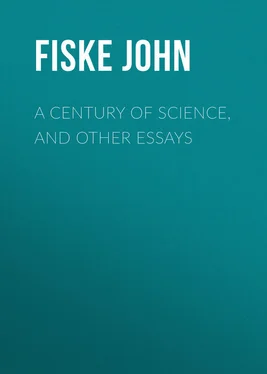John Fiske - A Century of Science, and Other Essays
Здесь есть возможность читать онлайн «John Fiske - A Century of Science, and Other Essays» — ознакомительный отрывок электронной книги совершенно бесплатно, а после прочтения отрывка купить полную версию. В некоторых случаях можно слушать аудио, скачать через торрент в формате fb2 и присутствует краткое содержание. Жанр: foreign_antique, foreign_prose, на английском языке. Описание произведения, (предисловие) а так же отзывы посетителей доступны на портале библиотеки ЛибКат.
- Название:A Century of Science, and Other Essays
- Автор:
- Жанр:
- Год:неизвестен
- ISBN:нет данных
- Рейтинг книги:3 / 5. Голосов: 1
-
Избранное:Добавить в избранное
- Отзывы:
-
Ваша оценка:
- 60
- 1
- 2
- 3
- 4
- 5
A Century of Science, and Other Essays: краткое содержание, описание и аннотация
Предлагаем к чтению аннотацию, описание, краткое содержание или предисловие (зависит от того, что написал сам автор книги «A Century of Science, and Other Essays»). Если вы не нашли необходимую информацию о книге — напишите в комментариях, мы постараемся отыскать её.
A Century of Science, and Other Essays — читать онлайн ознакомительный отрывок
Ниже представлен текст книги, разбитый по страницам. Система сохранения места последней прочитанной страницы, позволяет с удобством читать онлайн бесплатно книгу «A Century of Science, and Other Essays», без необходимости каждый раз заново искать на чём Вы остановились. Поставьте закладку, и сможете в любой момент перейти на страницу, на которой закончили чтение.
Интервал:
Закладка:
A word is all that can be spared for other parts of our friend's work, which deserve many words, and those carefully considered. His book on "Household Science" is not the usual collection of scrappy comment, recipe, and apothegm, but a valuable scientific treatise on heat, light, air, and food in their relations to every-day life. In his "Correlation of Physical Forces" he brings together the epoch-making essays of the men who have successively established that doctrine, introducing them with an essay of his own, in which its history and its philosophical implications are set forth in a masterly manner. In his book on the "Culture demanded by Modern Life" we have a similar collection of essays with a similar excellent original discussion, showing the need for wider and later training in science, and protesting against the excess of time and energy that is spent in classical education where it is merely the following of an old tradition.
As a crown to all this useful work, Youmans established, in 1872, "The Popular Science Monthly," which has unquestionably been of high educational value to the general public. It was not the aim of this magazine to give an account of every theory expounded, every fact observed, every discovery made, from year to year, whether significant or insignificant. The mind of the people is not educated by dumping a great unshapely mass of facts into it. It needs to be stimulated rather than crammed. Education in science should lead one to think for one's self. The scientific magazine, therefore, should present articles from all quarters that deal with the essential conceptions of science or discuss problems of real theoretical or practical interest, no matter whether every particular asteroid or the last new species of barnacle receives full attention or not. "The Popular Science Monthly" has now been with us eighteen years; its character has always been of the highest, and it must have exerted an excellent influence not only as a diffuser of valuable knowledge, but in training its readers to scientific habits of thought in so far as mere reading can contribute to such a result.
In concluding our survey of this useful and noble life, what impresses us most, I think, is the broad democratic spirit and the absolute unselfishness which it reveals at every moment and in every act. To Edward Youmans the imperative need for educating the great mass of the people so as to use their mental powers to the best advantage came home as a living, ever present fact. He saw all that it meant and means in the raising of mankind to a higher level of thought and action than that upon which they now live. To this end he consecrated himself with unalloyed devotion; and we who mourn his loss look back upon his noble career with a sense of victory, knowing how the good that such a man does lives after him and can never die.
March, 1890.
IV
THE PART PLAYED BY INFANCY IN THE EVOLUTION OF MAN 16 16 Short-hand report of my speech at a dinner given for me by Mr. John Spencer Clark, at the Aldine Club, New York, May 13, 1895.
The remarks which my friend Mr. Clark has made with reference to the reconciling of science and religion seem to carry me back to the days when I first became acquainted with the fact that there were such things afloat in the world as speculations about the origin of man from lower forms of life; and I can recall step by step various stages in which that old question has come to have a different look from what it had thirty years ago. One of the commonest objections we used to hear, from the mouths of persons who could not very well give voice to any other objection, was that anybody, whether he knows much or little about evolution, must have the feeling that there is something degrading about being allied with lower forms of life. That was, I suppose, owing to the survival of the old feeling that a dignified product of creation ought to have been produced in some exceptional way. That which was done in the ordinary way, that which was done through ordinary processes of causation, seemed to be cheapened and to lose its value. It was a remnant of the old state of feeling which took pleasure in miracles, which seemed to think that the object of thought was more dignified if you could connect it with something supernatural; that state of culture in which there was an altogether inadequate appreciation of the amount of grandeur that there might be in the slow creative work that goes on noiselessly by little minute increments, even as the dropping of the water that wears away the stone. The general progress of familiarity with the conception of evolution has done a great deal to change that state of mind. Even persons who have not much acquaintance with science have at length caught something of its lesson, – that the infinitely cumulative action of small causes like those which we know is capable of producing results of the grandest and most thrilling importance, and that the disposition to recur to the cataclysmic and miraculous is only a tendency of the childish mind which we are outgrowing with wider experience.
The whole doctrine of evolution, and in fact the whole advance of modern science from the days of Copernicus down to the present day, have consisted in the substitution of processes which are familiar and the application of those processes, showing how they produce great results.
When Darwin's "Origin of Species" was first published, when it gave us that wonderful explanation of the origin of forms of life from allied forms through the operation of natural selection, it must have been like a mental illumination to every person who comprehended it. But after all it left a great many questions unexplained, as was natural. It accounted for the phenomena of organic development in general with wonderful success, but it must have left a great many minds with the feeling: If man has been produced in this way, if the mere operation of natural selection has produced the human race, wherein is the human race anyway essentially different from lower races? Is not man really dethroned, taken down from that exceptional position in which we have been accustomed to place him, and might it not be possible, in the course of the future, for other beings to come upon the earth as far superior to man as man is superior to the fossilized dragons of Jurassic antiquity?
Such questions used to be asked, and when they were asked, although one might have a very strong feeling that it was not so, at the same time one could not exactly say why. One could not then find any scientific argument for objections to that point of view. But with the further development of the question the whole subject began gradually to wear a different appearance; and I am going to give you a little bit of autobiography, because I think it may be of some interest in this connection. I am going to mention two or three of the successive stages which the whole question took in my own mind as one thing came up after another, and how from time to time it began to dawn upon me that I had up to that point been looking at the problem from not exactly the right point of view.
When Darwin's "Descent of Man" was published in 1871, it was of course a book characterized by all his immense learning, his wonderful fairness of spirit and fertility of suggestion. Still, one could not but feel that it did not solve the question of the origin of man. There was one great contrast between that book and his "Origin of Species." In the earlier treatise he undertook to point out a vera causa of the origin of species, and he did it. In his "Descent of Man" he brought together a great many minor generalizations which facilitated the understanding of man's origin. But he did not come at all near to solving the central problem, nor did he anywhere show clearly why natural selection might not have gone on forever producing one set of beings after another distinguishable chiefly by physical differences. But Darwin's co-discoverer, Alfred Russel Wallace, at an early stage in his researches, struck out a most brilliant and pregnant suggestion. In that one respect Wallace went further than ever Darwin did. It was a point of which, indeed, Darwin admitted the importance. It was a point of which nobody could fail to understand the importance, that in the course of the evolution of a very highly organized animal, if there came a point at which it was of more advantage to that animal to have variations in his intelligence seized upon and improved by natural selection than to have physical changes seized upon, then natural selection would begin working almost exclusively upon that creature's intelligence, and he would develop in intelligence to a great extent, while his physical organism would change but slightly. Now, that of course applied to the case of man, who is changed physically but very slightly from the apes, while he has traversed intellectually such a stupendous chasm.
Читать дальшеИнтервал:
Закладка:
Похожие книги на «A Century of Science, and Other Essays»
Представляем Вашему вниманию похожие книги на «A Century of Science, and Other Essays» списком для выбора. Мы отобрали схожую по названию и смыслу литературу в надежде предоставить читателям больше вариантов отыскать новые, интересные, ещё непрочитанные произведения.
Обсуждение, отзывы о книге «A Century of Science, and Other Essays» и просто собственные мнения читателей. Оставьте ваши комментарии, напишите, что Вы думаете о произведении, его смысле или главных героях. Укажите что конкретно понравилось, а что нет, и почему Вы так считаете.












